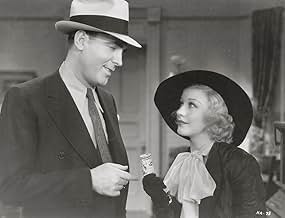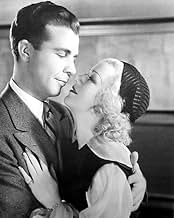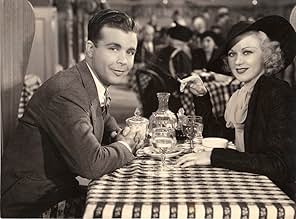Füge eine Handlung in deiner Sprache hinzuUnscrupulous agent Rush makes singing waiter Clayton a big radio star while Peggy, who has lost her own radio show, helps Clayton.Unscrupulous agent Rush makes singing waiter Clayton a big radio star while Peggy, who has lost her own radio show, helps Clayton.Unscrupulous agent Rush makes singing waiter Clayton a big radio star while Peggy, who has lost her own radio show, helps Clayton.
- Auszeichnungen
- 1 wins total
- The Mills Brothers
- (as The Four Mills Bros.)
- Ted Rio Rita and His Orchestra
- (as Ted Fio Rito and His Band)
- Herbert Brokman
- (as Joseph Cawthorne)
- Three Mimics
- (as The Three Radio Rogues)
- One of the Three Radio Rogues
- (as Jim Hollingwood)
Empfohlene Bewertungen
O'Brien played this part so often in those years he could have phoned in the performance, but it's what you expect of him. He finds Powell as a singing waiter doing a boffo version of The Man On The Flying Trapeze, a very popular song in 1934 with it getting a prominent place in It Happened One Night.
Pat may be a little too sharp for his own good, but he does know talent and he brings him to radio station owner Grant Mitchell and sponsor Joseph Cawthorn. They've got a girl singer in Ginger Rogers already, but Ginger and Dick hit it off. But there are complications and they make up the rest of this film.
Harry Warren and Al Dubin wrote most of the original score for this film and the best song in the film is one of my personal favorite Dick Powell number, I'll String Along With You. It's sung both solo and as a duet with Rogers. Powell recorded it and Fair and Warmer for Brunswick records and it enjoyed a good sale during the Depression. It was recycled for Doris Day for her film My Dream Is Your's where it's done as a lullaby to her small son. But when you hear Powell do it, you will hear him at his best as a singer. Interestingly enough Doris's film is also about the radio industry. Powell also does a nice scat version with the Mills Brothers of Out For No Good which is also done by Rogers as a solo.
Twenty Million Sweethearts was done by Ginger on loan out from RKO where she had just signed a long term contract. She had just done Flying Down To Rio, her first with Fred Astaire. Previously she had worked with Powell though not opposite him in 42nd Street and Golddiggers of 1933. Jack Warner thought they'd make a good team together and they did make some beautiful music and beautiful box office. But she made even bigger box office with Flying Down To Rio over at RKO with Astaire and RKO wasn't about to give her up. So the screen team of Powell and Rogers never made another film.
Take note of the performance of Allen Jenkins as the grouchy host of a kid's radio program, he's got some very nice lines. When you hear talk of a Hooper rating, back in the day that referred to the barometer of popularity, like the Nielsen is for today's television. I liked hearing the Radio Rogues, only hearing them mind you, at the beginning of the movie where you hear them do their imitations of the current radio stars. They had appeared in Bing Crosby's We're Not Dressing earlier in the year at Paramount and now that they were not in his film, his imitation is added to their repertoire.
Twenty Million Sweethearts is charming and entertaining with a nice cast going through their usual paces on screen. It may not be the best film ever made about radio, but until the day that one comes along, I'll string along with Twenty Million Sweethearts.
Modern audiences won't be very taken by what passes as the comedy in "Twenty Million Sweethearts." Most fans from the mid-20th century on didn't care much either for the fast-talking, bombastic personas such as Pat O'Brien sometimes played, as he does here. That was something that apparently enjoyed a short stint of popularity in early sound pictures, but quickly died out within a few years. O'Brien's Rush Blake is as much a cad as he is a good guy, and while his boisterous character is just tolerable, his last tirade toward the end of the film is way overboard. It's not only unnecessary, but it would have improved the film to have left that on the cutting room floor. The only real comedy is in the short scenes with Allen Jenkins who plays Pete, host of a children's afternoon radio show.
But for most of this movie, audiences are in for a treat, seeing the singing that was popular at that time. Dick Powell had a very good tenor voice, and he plays a very likeable Buddy Clayton. And opposite him is a very young Ginger Rogers as Peggy Cornell, who shows that she could sing a nice tune. And, another special reason for seeing and enjoying this film is the Mills Brothers. This was just the second of a dozen films the famous singing foursome would be in. This is in their early years with some of the humorous tunes they sang then. By the 1940s, they would skyrocket on the music charts with many hit tunes over three decades. Performing until the early 1970s, the Mills Brothers would record more than 2,000 songs that sold more than 50 million records.
No other artists or groups could sing their top hits tunes as well, and no others even tried to record some of their best tunes. The lasting talent and quality of the Mills Brothers is proven as some of their top tunes are still heard on radio music programs and in occasional modern films. Once one heard these songs, they'd be remembered forever as sung by the Mills Brothers - "Paper Doll" of 1943, "St. Louis Blues" of 1944, "You Always Hurt the One You Love" of 1944, "Glow-Worm" of 1952, "Memory Lane" of 1956, "Say Si Si" of 1964, "Dream a Little Dream of Me" of 1968, and "Dream" of 1969.
This is a movie to enjoy the old-fashioned type of stage shows, the heyday of radio entertainment, and a look at top and upcoming musical talents of the time.
The best humorous line in the fine was by Pete, when actor Jenkins says, "I hate kids. I think every child should be born at the age of 20. Maybe they'd have some sense."
Dick Powell plays Buddy Clayton, a singing waiter in a beer garden discovered by the slippery fast-talking talent scout Rush Blake (Pat O'Brien). Rush takes Buddy back east where he becomes a radio singing sensation and heartthrob, although it does take awhile and a few odd quirks of fate. In the meantime, Buddy has started up a romance with singer Peggy Cornell (Ginger Rogers) that is leading to the altar, but the sponsor of the radio show on which Buddy sings says that a married heartthrob is no heartthrob at all, and instructs Rush to talk the pair out of marriage. This split is at first amicable and temporary, but then Rush dreams up a publicity stunt that misfires hilariously.
The film features the music and lyrics of Warren and Dubin, the comic support of familiar Warner contract player Allen Jenkins, and the direction of Ray Enright who managed to get this one right - it's funny in all the right places without being inane.
They really put a damper on Ginger Rogers' performance this time. After playing the tough precode chorine in the earlier Berkeley musicals, here they've turned down the volume on her sauciness a couple of notches. Plus, in anticipation of the production code, the romance between Peggy and Buddy is squeaky clean. There is no taking a can opener to metal bathing suits or checking into the Honeymoon Hotel in this musical as there was the previous year.
Highly recommended as a pleasant way to spend 90 well-paced minutes.
Wusstest du schon
- WissenswertesScreenwriter Julius J. Epstein first arrived in Hollywood about 10:30 p.m. on October 14, 1933 and by midnight was collaborating on the screenplay of Twenty Million Sweethearts (1934) as pages had to be turned in early Monday morning.
- PatzerAt about the one-hour mark Buddy Clayton (Dick Powell) is in a hotel room chatting with Pete (Allen Jenkins). As Powell reaches, his vest buttons itself.
- Zitate
Pete: Well, I've put all the kiddies east of the Mississippi to bed. How's rehearsal?
Peggy Cornell: Oh awful. Some yokel stood outside the rehearsal hall making and stared at me until I nearly broke me up. What have you got a summons?
Pete: No, fan mail.
Peggy Cornell: Oh. Three of them. That's two more than last week! Your public are growing up and learning to write.
Pete: Listen to this: Dear Uncle Pete. I am well. How are you? I hear you on the radio every night. Great stuff for a he man poet... Have you heard my last poem, Peggy?
Peggy Cornell: I sure hope so.
Pete: Frankie Wallace was a pug. He laid his opponents out like a rug. Until one day... Wait a minute! You haven't heard the last of it.
Peggy Cornell: Well. You've got me cornered.
Pete: Frankie Wallace was a pug. He laid his opponents out like a rug...
- VerbindungenFeatured in Die Kunst zu lieben (1971)
- SoundtracksThe Last Round-Up
(1933) (uncredited)
Written by Billy Hill
Sung with modified lyrics by Eddie Foster, Billy Snyder, Matt Brooks and Morris Goldman
Top-Auswahl
Details
- Erscheinungsdatum
- Herkunftsland
- Sprache
- Auch bekannt als
- Hot Air
- Drehorte
- Produktionsfirma
- Weitere beteiligte Unternehmen bei IMDbPro anzeigen
- Laufzeit
- 1 Std. 29 Min.(89 min)
- Farbe
- Sound-Mix
- Seitenverhältnis
- 1.37 : 1
































